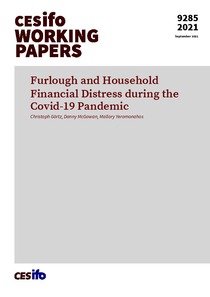Furlough and household financial distress during the Covid-19 pandemic

Görtz, Christoph ; McGowan, Danny ; Yeromonahos, Mallory
CESifo - Munich
2021
47 p.
epidemic disease ; short time working ; structural unemployment ; social inequality ; income distribution
CESifo working paper
9285
Unemployment
English
Bibliogr.
"We study how furlough affects household financial distress during the COVID-19 pandemic. Furlough increases the probability of late housing and bill payments by 30% and 9%, respectively. The effects exist for individuals who rent their home, but not mortgagees who can mitigate financial distress by reducing expenditure during furlough by deferring mortgage payments though the Mortgage Holiday Scheme. Furloughed individuals significantly reduce expenditure and spend their savings to offset furlough-induced income reductions. This creates wealth inequality but lowers the probability a furloughed worker experiences financial distress after returning to work. Estimates show an 80% government contribution to furloughed workers' wages minimizes the incidence of financial distress at the lowest cost to taxpayers."
Digital
The ETUI is co-funded by the European Union. Views and opinions expressed are however those of the author(s) only and do not necessarily reflect those of the European Union or the ETUI.